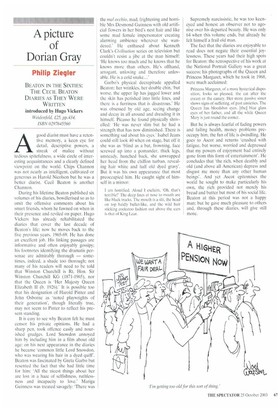A picture of Dorian Gray
Philip Ziegler
BEATON IN THE SIXTIES: THE CECIL BEATON DIARIES AS THEY WERE WRITTEN introduced by Hugo Vickers Weidenfeld, £25, pp.434, ISBN 0297645560 Agood diarist must have a retentive memory, a keen eye for detail, descriptive powers, a streak of malice without tedious spitefulness, a wide circle of interesting acquaintances and a clearly defined viewpoint on the world. Chips Channon was not nearly as intelligent, cultivated or generous as Harold Nicolson but he was a better diarist. Cecil Beaton is another Channon.
During his lifetime Beaton published six volumes of his diaries, bowdlerised so as to omit the offensive comments about his smart friends, whom he fawned on when in their presence and reviled on paper. Hugo Vickers has already rehabilitated the diaries that cover the last decade of Beaton's life; now he moves back to the five previous years, 1965-69. He has done an excellent job. His linking passages are informative and often enjoyably gossipy; his footnotes identifying the dramatis personae are admirably thorough — sometimes, indeed, a shade too thorough; not many of his readers will need to be told that Winston Churchill is Rt. Hon. Sir Winston Churchill KG (1871-1965), nor that the Queen is 'Her Majesty Queen Elizabeth II (b. 1926).' It is possible too that his designation of Harold Pinter and John Osborne as 'noted playwrights of their generation', though literally true, may not seem to Pinter to reflect his present standing.
It is easy to see why Beaton felt he must censor his private opinions. He had a sharp pen, took offence easily and nourished grudges. Lord Snowdon annoyed him by including him in a film about old age: on his next appearance in the diaries he became 'common little Lord Snowdon, who was wearing his hair in a dyed quiff'. Beaton was fascinated by Greta Garbo but resented the fact that she had little time for him: 'All the nicest things about her are lost in a haze of selfishness, ruthlessness and incapacity to love.' Mariga Guinness was treated savagely: 'There was
the mal occhio, mad. frightening and horrible Mrs Desmond Guinness with old artificial flowers in her bird's nest hair and like some mad female impersonator creating alarming ambience wherever she wandered.' He enthused about Kenneth Clark's Civilisation series on television but couldn't resist a jibe at the man himself: 'He knows too much and he knows that he knows more than others. He's offhand, arrogant, unloving and therefore unlovable. He is a cold snake...'
Garbo's physical decrepitude appalled Beaton: her wrinkles, her double chin, 'but worse, the upper lip has jagged lower and the skin has perished into little lines, and there is a furriness that is disastrous.' He was obsessed by old age, seeing change and decay in all around and dreading it in himself. Picasso he found physically shrivelled: 'He was never slim but he had a strength that has now diminished. There is something sad about his eyes,' Isabel Jeans could still look 40 when on stage, hut off it she was as 'blind as a bat, frowning, face screwed up into a pomander, thick legs, unsteady, hunched back, she unwrapped her head from the chiffon turban, revealing hair white and half old dyed gravy'. But it was his own appearance that most preoccupied him. He caught sight of himself in a mirror:
I am horrified. Aloud 1 exclaim, 'Oh, that's terrible!' The deep lines at nose to mouth are like black tracks. The mouth is a slit, the head on top baldly bullet-like, and the wild hair sticking cockatoo fashion out above the ears is that of King Lear.
Supremely narcissistic, he was too keeneyed and honest an observer not to agonise over his departed beauty. He was only 64 when this volume ends, but already he felt himself a frail old man.
The fact that the diaries are enjoyable to read does not negate their essential joylessness. These years had their high spots for Beaton: the retrospective of his work at the National Portrait Gallery was a great success; his photographs of the Queen and Princess Margaret, which he took in 1968, were much acclaimed:
Princess Margaret, of a more hysterical disposition, looks so pleased, the cat after the cream or the canary. Her more passive sister shows signs of suffering, of past anxieties. The Queen has bloodshot eyes. [the] blue glass eyes of her father, and all the while Queen Mary is just round the corner.
But he is always fearful of fading powers and failing health, money problems preoccupy him, the fun of life is dwindling. He goes to Ascot and returns 'crushed with fatigue, but worse, worried and depressed that my powers of enjoyment had entirely gone from this form of entertainment'. He concludes that 'the rich, when deathly and old (and above all American) depress and disgust me more than any other human beings'. And yet Ascot epitomises the world he sought to make particularly his own, the rich provided not merely his bread and butter but most of his social life. Beaton at this period was not a happy man: but he gave much pleasure to others and, through these diaries, will give still more.


































































































 Previous page
Previous page